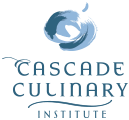Sustainability Initiatives
“Green” Instruction and Operations
A primary learning outcome within the Cascade Culinary Institute® curriculum model is to teach students about current industry standards that relate to sustainable hospitality industry practices. The Farm-to-Table course and Elevation restaurant serve as mediums where students are exposed to the principles of sustainability as it relates with food/beverage sourcing, waste management, and energy conservation. CCI’s goal is to embrace Eat Local principles and to integrate sustainable operational practices that students can implement in their future careers within the hospitality industry. Our menu features locally-sourced produce, proteins, cheeses, grains, and Oregon-produced alcoholic and non-alcoholic beverages. Sustainability also guides the operational aspect of the facility. Throughout the Jungers Culinary Center, waste is minimized through a formal program that manages composting, recycling, and the use of green chemicals for ware-washing. The Jungers Culinary Center was constructed to Earth Advantage Commercial Gold certification standards. Green construction and energy efficiency practices include:
- Radiant floor heating
- High efficiency exhaust hoods
- Tank-free on-demand water heaters
- 1.5% of the total construction budget for the Jungers Culinary Center contributes to solar energy elsewhere on the COCC campus.
- Students at Central Oregon Community College also approved a 25 cents per credit hike in student fees to finance renewable energy purchases and sustainability projects for the campus. The fee is used first to buy wind power to meet about 75% of campus electricity needs. The wind energy is purchased through Pacific Power’s Blue Sky green power program. Any excess funds generated from the fee goes into a “Flexible Sustainability Fund” to be allocated for campus sustainability projects.
Receive email notices about upcoming events.

